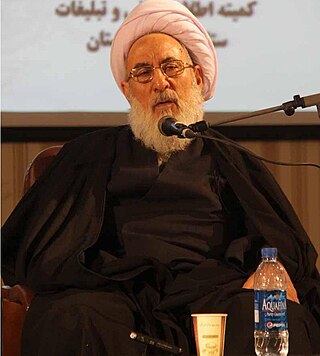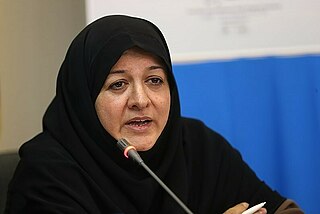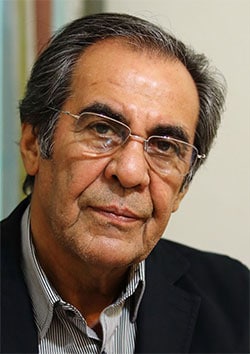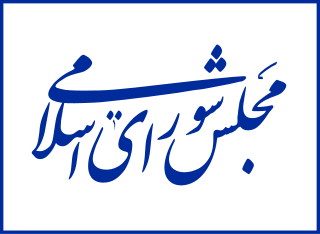
Ayatollah Mohsen Mojtahed Shabestari was an Iranian Shiite cleric and politician. He was a member of the 1st, 2nd, 3rd, 4th and 5th Assembly of Experts from the East Azerbaijan electorate. 4th term Mojtahed Shabestari won with 671,254 and last period 743,818 votes. He was MP of Islamic Consultative Assembly in the electoral district of Tehran in the beginning of the revolution for first, second, fourth and fifth terms.

Fatemeh Rakeei is an Iranian politician, linguist, poet and Alzahra University faculty. Rakei was born in Zanjan, Zanjan Province. She was a member of the 6th Islamic Consultative Assembly from the electorate of Tehran. Now she is the secretary-general of population Muslim women modernity.

Fatemeh Rahbar was an Iranian conservative politician who served three terms as a member of the Iranian Parliament representing Tehran, Rey, Shemiranat, and Eslamshahr. Rahbar was elected to serve in the Parliament for a fourth time, but died before the start of her term.

Mostafa Tabrizi is a psychologist and counselor and reformist politician who is currently representing Bojnourd constituency in the first term of the Parliament of Iran in the Islamic Consultative Assembly.

The Specialized Commissions of the Parliament of Iran are groups of representatives that are formed with the aim of expertly reviewing the plans and bills proposed in the Islamic Consultative Assembly of Iran.

This is an article introducing the board of directors of the Iranian parliament and legislative system of the Islamic Republic of Iran called the Islamic Consultative Assembly.

Pursuant to Article 41 of the Law on Internal Regulations of the Islamic Consultative Assembly, the Integration Commission of the Islamic Consultative Assembly, in order to regulate the principles and provisions of development programs and budget bills of the whole country and to establish coordination between the specialized commissions of the Islamic Consultative Assembly, after the relevant bill is submitted by the government to the Assembly, is formed consisting of the following members:
- Nine people from the Program, Budget and Accounting Commission
- Three people from other specialized commission

Pursuant to Article 51 of the Law on Internal Regulations of the Islamic Consultative Assembly, the Program, Budget and Accounting Commission of the Islamic Consultative Assembly shall be formed to perform the assigned tasks within the scope of the country program, country budget, supervision of the program and budget and the Court of Accounts and Finance of the Assembly, and to provide statistics and general technical services in accordance with the provisions of the regulation.

Pursuant to Article 42 of the Law on Internal Regulations of the Islamic Consultative Assembly, the Investigative Commission of the Islamic Consultative Assembly is responsible for reviewing the credentials of members of the Assembly who have not been approved by the branches or have been challenged by other representatives. The fifteen branches of the Islamic Consultative Assembly, after appointing their board of directors, are obliged to nominate two of their members who are more knowledgeable about legal issues and have the necessary qualifications to join the Investigative Commission to be read in the public meeting of the Assembly. Therefore, the Investigative Commission will have 15 main members and 15 alternate members.

Pursuant to Article 43 of the Law on Internal Regulations of the Islamic Consultative Assembly, the Internal Regulation Commission of the Islamic Consultative Assembly is responsible for reviewing plans and bills proposed by the representatives and branches to amendment of internal regulations and change in the process of implementation of affairs of the Assembly. The commission evaluates the relevant plans and bills and reports the result. Each of the fifteen branches of the Islamic Consultative Assembly is obliged to nominate one of its qualified members to be a member of this commission so that the result can be determined after reviewing his / her credentials. Therefore, the Internal Regulation Commission of the Islamic Consultative Assembly will have 15 members.

Pursuant to Article 44 of the Law on Internal Regulations of the Islamic Consultative Assembly, the Article 90 of the Constitution Commission of the Islamic Consultative Assembly is formed in order to organize and streamline the Assembly and the representatives, especially in relation to the work of the Executive, Judiciary and Parliament branches, based on various articles of the constitution, especially its ninetieth article. The structure of the members of this commission is as follows:
- One representative from each specialized commission of the Assembly
- Eight representatives elected by the heads of branches and the board of directors of the Assembly as permanent members

Pursuant to Article 46 of the Law on Internal Regulations of the Islamic Consultative Assembly, the Education, Research and Technology Commission of the Islamic Consultative Assembly shall be formed in accordance with the provisions of the regulations to perform its assigned duties in the areas of general education, technical and vocational education, higher education and research and technology matters in the Islamic Republic of Iran.

Pursuant to Article 47 of the Law on Internal Regulations of the Islamic Consultative Assembly, the Social Commission of the Islamic Consultative Assembly is formed to perform the assigned duties in the scope of administrative and employment affairs, labor, occupation, labor relations and cooperation in accordance with the provisions of the regulation.

Pursuant to Article 52 of the Law on Internal Regulations of the Islamic Consultative Assembly, the Health and Medical Commission of the Islamic Consultative Assembly is formed to perform the assigned duties in the field of health, treatment, relief, welfare, social security, social insurance and the Red Crescent affairs in the country in accordance with the provisions of the regulation.

Pursuant to Article 53 of the Law on Internal Regulations of the Islamic Consultative Assembly, the Internal Affairs of the Country and Councils Commission of the Islamic Consultative Assembly is formed to perform its assigned duties within the scope of domestic policy, councils, non-civil affairs of municipalities and civil registration in accordance with the provisions of the regulation.

Pursuant to Article 54 of the Law on Internal Regulations of the Islamic Consultative Assembly, the Industries and Mines Commission of the Islamic Consultative Assembly is formed to perform its assigned duties in the fields of industries, post, telecommunications, mines, petrochemical, aerospace and communications industries in accordance with the provisions of the regulation.

Pursuant to Article 55 of the Law on Internal Regulations of the Islamic Consultative Assembly, the Civil Commission of the Islamic Consultative Assembly is formed to perform its assigned duties in the fields of road maintenance and transportation, housing, urban and rural development, and civil affairs of municipalities in accordance with the provisions of the regulation.

Pursuant to Article 56 of the Law on Internal Regulations of the Islamic Consultative Assembly, the Cultural Commission of the Islamic Consultative Assembly is formed to perform its assigned duties in the fields of culture and art, guidance and propaganda, radio and television and mass communication, physical education and youth, women and family in accordance with the provisions of the regulation.

Pursuant to Article 57 of the Law on Internal Regulations of the Islamic Consultative Assembly, the Judiciary and Legal Commission of the Islamic Consultative Assembly is formed to perform its assigned duties within the judicial and legal framework in accordance with the provisions of the regulation.

Pursuant to Article 58 of the Law on Internal Regulations of the Islamic Consultative Assembly, the Agriculture, Water, Natural Resources and Environment Commission of the Islamic Consultative Assembly is formed to perform its assigned duties in the fields of agriculture, water resources, livestock and poultry, fisheries, the environment and meteorology in accordance with the provisions of the regulation.










